Related Research Articles
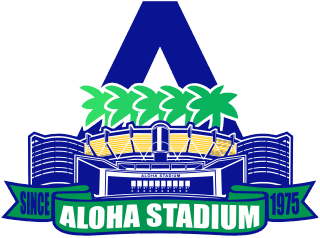
Aloha Stadium is a closed multi-purpose stadium located in Halawa, Hawaii, a western suburb of Honolulu. It is the largest stadium in the state of Hawaii. As of December 2020, the stadium ceased fan-attended operations indefinitely, and placed a moratorium on the scheduling of new events.

The Hawaiʻi Bowl is a college football bowl game that has been played in the Honolulu, Hawaii area since 2002. The game was originally held at Aloha Stadium in Halawa, Hawaii, a suburb of Honolulu, before moving to the Clarence T. C. Ching Athletics Complex in 2022. The bowl is one of the post-season contests run by ESPN Events. Typically played on or near Christmas Eve, the bowl normally features a team from the Mountain West Conference, playing a team from either the American Athletic Conference or Conference USA. Since the 2021 edition of the bowl, it is sponsored by EasyPost. Previous sponsors include ConAgra Foods (2002) and Sheraton Hotels and Resorts Hawaii (2003–2013), and SoFi (2018–2019).
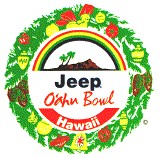
The Oahu Bowl was a National Collegiate Athletic Association Football Bowl Subdivision bowl game played in Honolulu, Hawaii at Aloha Stadium. Played on Christmas Day or Christmas Eve, the Oahu Bowl was sponsored by the Jeep Division of Chrysler Corporation. The inaugural game was played in 1998 and the last game was played in 2000, after it lost its sponsorship as a result of a corporate merger between Jeep parent Chrysler Corporation and Daimler Benz. The Oahu Bowl was part of a double-header played after the Aloha Bowl on Christmas its first two years; the 2000 game was played on Christmas Eve.

The Hula Bowl is a post-season college football all-star game held annually, usually in January. From inception through the 2021 playing, it was held in Hawaii; since the 2022 edition, it has been played in Orlando, Florida.

Honolulu Stadium was a multi-purpose stadium located in the Moʻiliʻili district of Honolulu, Hawai'i, at the corner of King and Isenberg Streets. Opened in 1926, it was the primary sports venue in Hawaiʻi preceding Aloha Stadium. During its final years, the stadium could hold about 25,000 fans; it was demolished in 1976. A public park, Old Stadium Park, now occupies the location. A plaque at the corner of King and Isenberg commemorates the stadium. Some of the property wall that stood behind the stands on the west end still remains.
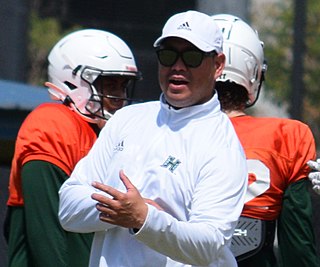
Timothy Kealii'okaaina Awa Chang is an American football coach and former quarterback who is currently the head coach of the Hawaii Rainbow Warriors. During his playing career at Hawaii, he set several major college football passing records, including the NCAA record for most all-time passing yards; this record was later eclipsed by Case Keenum in 2011.
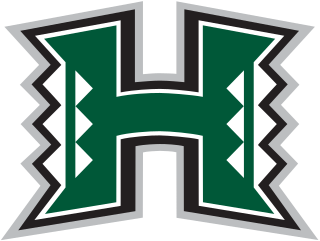
The Hawaii Rainbow Warriors football team represents the University of Hawaiʻi at Mānoa in NCAA Division I FBS college football. It was part of the Western Athletic Conference until July 2012, when the team joined the Mountain West Conference.
The Pineapple Bowl was a college football bowl game played during the 1940s and early 1950s in Honolulu, Hawaii, at Honolulu Stadium. The game featured the then-Hawaii Rainbows and an invited team from the mainland.

The Fresno State–Hawaii football rivalry is an American college football rivalry between the Fresno State Bulldogs and the Hawaii Rainbow Warriors. Also nicknamed the Battle for the Golden Screwdriver, it is Hawaii's most-played rivalry series. The two teams have met 55 times, with Fresno State leading the all-time series 30–24–1 through the 2022 season.
The 1941 Hawaii Deans football team was an American football team that represented the University of Hawaii as an independent during the 1941 college football season. The team compiled an 8–1 record and outscored opponents by a total of 280 to 83. The season was shortened by two games following the Attack on Pearl Harbor.
The 1946 Hawaii Rainbows football team was an American football team that represented the University of Hawaii as an independent during the 1946 college football season. In its second non-consecutive season under Tom Kaulukukui, the team compiled an 8–2 record and outscored opponents by a total of 275 to 93.
The 1947 Hawaii Rainbows football team was an American football team that represented the University of Hawaii as an independent during the 1947 college football season. In its third season under head coach Tom Kaulukukui, the team compiled an 8–5 record, including a 27–13 victory over Fresno State in the 17th annual Shrine Game, and a 33–32 victory over Redlands in the fourth annual Pineapple Bowl. The team played its home games at Honolulu Stadium in Honolulu.
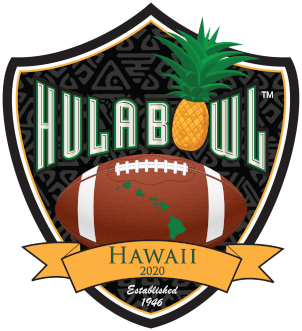
The 2020 Hula Bowl was a post-season college football all-star game played on January 26, 2020, at 5:30 p.m. HST, at Aloha Stadium in Honolulu, Hawaii. The game featured "NCAA college football players from all divisions, along with international players". The game was the last of the 2019–20 bowl games and, while not restricted to FBS players, it was the final game of the 2019 FBS football season.

Chevan Cordeiro is an American football quarterback for the San Jose State Spartans. He previously played at the University of Hawaii. A native of Honolulu, Cordeiro has earned the reputation of being the Rainbow Warriors "closer" for his ability to enter games in relief and maintain the lead that the team has built up prior to his appearance in the game or mount a late game comeback.
The 1989 Hawaii Rainbow Warriors football team represented the University of Hawaiʻi at Mānoa in the Western Athletic Conference during the 1989 NCAA Division I-A football season. In their third season under head coach Bob Wagner, the Rainbow Warriors compiled a 9–3–1 record.
The 1970 Hawaii Rainbows football team represented the University of Hawaiʻi at Mānoa as an independent during the 1970 NCAA College Division football season. In their third season under head coach Dave Holmes, the Rainbows compiled a 9–2 record.
The 1971 Hawaii Rainbows football team represented the University of Hawaiʻi at Mānoa as an independent during the 1971 NCAA College Division football season. In their fourth season under head coach Dave Holmes, the Rainbows compiled a 7–4 record.
Samuel Doyle Nave was an American football player and coach. He was known for coming off the bench and throwing the game-winning touchdown in the 1939 Rose Bowl. He was drafted 6th overall by the Detroit Lions but did not play for them. Afterwards he was the head coach of the Hawaii Polar Bears, a minor-league team.

The 2022 Hawaii Rainbow Warriors football team represents the University of Hawaiʻi at Mānoa in the 2022 NCAA Division I FBS football season. Led by first-year head coach Timmy Chang, the Rainbow Warriors play their home games at the Clarence T. C. Ching Athletics Complex as members of the West Division of the Mountain West Conference.
References
- 1 2 3 McQueen, Red (December 20, 1938). "Hoomalimali (column)". The Honolulu Advertiser . p. 10. Retrieved December 24, 2022– via newspapers.com.
- ↑ "College Football Reference - Poi Bowl". Archived from the original on 2008-03-02. Retrieved 2007-12-03.
- ↑ "University Will Battle Stars Today". The Honolulu Advertiser . January 2, 1937. p. 6. Retrieved December 24, 2022– via newspapers.com.
- ↑ "Warriors Repulse Repeated Threats by Maroon Eleven". The Honolulu Advertiser . December 26, 1936. p. 6. Retrieved December 24, 2022– via newspapers.com.
- ↑ Mitsukaso, Andrew (December 28, 1936). "Powerful Team to Oppose Rainbows on New Year's Day". The Honolulu Advertiser . p. 9. Retrieved December 24, 2022– via newspapers.com.
- ↑ "Poi Bowl record". cfreference.net. Archived from the original on March 2, 2008. Retrieved December 24, 2022– via Wayback Machine.
- ↑ McQueen, Red (January 2, 1936). "Trojan Team Takes U.H. 38 to 6". The Honolulu Advertiser . p. 1. Retrieved December 24, 2022– via newspapers.com.
- ↑ McQueen, Red (January 3, 1937). "Early Lead Enables Rainbow Squad to Emerge Triumphant". The Honolulu Advertiser . p. 8. Retrieved December 24, 2022– via newspapers.com.
- ↑ McQueen, Red (January 2, 1938). "Huskies Prove Too Much for Rainbows; Surpass Fondest Fans' Expectations". The Honolulu Advertiser . p. 6. Retrieved December 24, 2022– via newspapers.com.
- ↑ McQueen, Red (January 3, 1939). "UCLA Conquers UH In 32 To 7 Skirmish". The Honolulu Advertiser . p. 8. Retrieved December 24, 2022– via newspapers.com.
- 1 2 "Bowl/All Star Game Records" (PDF). NCAA.org. NCAA. 2022. p. 181. Retrieved December 24, 2022.
- ↑ "Pineapple Bowl Game Won by UCLA Eleven". The Evening News . Harrisburg, Pennsylvania. January 3, 1939. p. 13. Retrieved December 24, 2022– via newspapers.com.
- ↑ "Hawaii Rainbow Warrior Media Guide" (PDF). hawaiiathletics.com. Hawaii Rainbow Warriors. 2022. p. 114. Retrieved December 24, 2022.